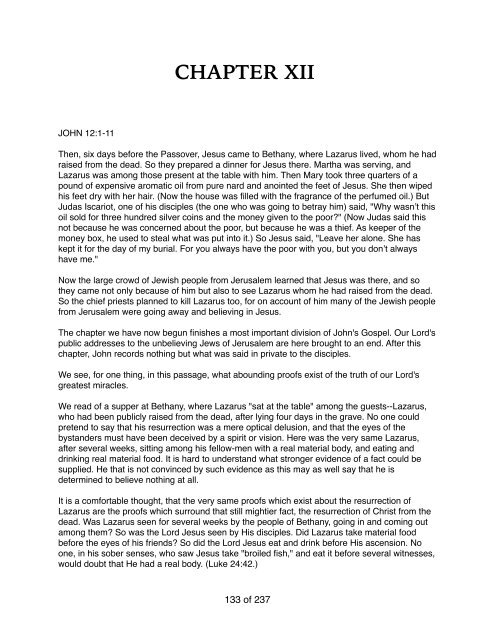J. C. Ryle John
John Charles Ryle (May 10, 1816 - June 10, 1900) was an evangelical Anglican clergyman and first Bishop of Liverpool. He was renowned for his powerful preaching and extensive tracts.
John Charles Ryle (May 10, 1816 - June 10, 1900) was an evangelical Anglican clergyman and first Bishop of Liverpool. He was renowned for his powerful preaching and extensive tracts.
You also want an ePaper? Increase the reach of your titles
YUMPU automatically turns print PDFs into web optimized ePapers that Google loves.
CHAPTER XII<br />
JOHN 12:1-11<br />
Then, six days before the Passover, Jesus came to Bethany, where Lazarus lived, whom he had<br />
raised from the dead. So they prepared a dinner for Jesus there. Martha was serving, and<br />
Lazarus was among those present at the table with him. Then Mary took three quarters of a<br />
pound of expensive aromatic oil from pure nard and anointed the feet of Jesus. She then wiped<br />
his feet dry with her hair. (Now the house was filled with the fragrance of the perfumed oil.) But<br />
Judas Iscariot, one of his disciples (the one who was going to betray him) said, "Why wasn’t this<br />
oil sold for three hundred silver coins and the money given to the poor?" (Now Judas said this<br />
not because he was concerned about the poor, but because he was a thief. As keeper of the<br />
money box, he used to steal what was put into it.) So Jesus said, "Leave her alone. She has<br />
kept it for the day of my burial. For you always have the poor with you, but you don’t always<br />
have me."<br />
Now the large crowd of Jewish people from Jerusalem learned that Jesus was there, and so<br />
they came not only because of him but also to see Lazarus whom he had raised from the dead.<br />
So the chief priests planned to kill Lazarus too, for on account of him many of the Jewish people<br />
from Jerusalem were going away and believing in Jesus.<br />
The chapter we have now begun finishes a most important division of <strong>John</strong>'s Gospel. Our Lord's<br />
public addresses to the unbelieving Jews of Jerusalem are here brought to an end. After this<br />
chapter, <strong>John</strong> records nothing but what was said in private to the disciples.<br />
We see, for one thing, in this passage, what abounding proofs exist of the truth of our Lord's<br />
greatest miracles.<br />
We read of a supper at Bethany, where Lazarus "sat at the table" among the guests--Lazarus,<br />
who had been publicly raised from the dead, after lying four days in the grave. No one could<br />
pretend to say that his resurrection was a mere optical delusion, and that the eyes of the<br />
bystanders must have been deceived by a spirit or vision. Here was the very same Lazarus,<br />
after several weeks, sitting among his fellow-men with a real material body, and eating and<br />
drinking real material food. It is hard to understand what stronger evidence of a fact could be<br />
supplied. He that is not convinced by such evidence as this may as well say that he is<br />
determined to believe nothing at all.<br />
It is a comfortable thought, that the very same proofs which exist about the resurrection of<br />
Lazarus are the proofs which surround that still mightier fact, the resurrection of Christ from the<br />
dead. Was Lazarus seen for several weeks by the people of Bethany, going in and coming out<br />
among them? So was the Lord Jesus seen by His disciples. Did Lazarus take material food<br />
before the eyes of his friends? So did the Lord Jesus eat and drink before His ascension. No<br />
one, in his sober senses, who saw Jesus take "broiled fish," and eat it before several witnesses,<br />
would doubt that He had a real body. (Luke 24:42.)<br />
133 of 237




